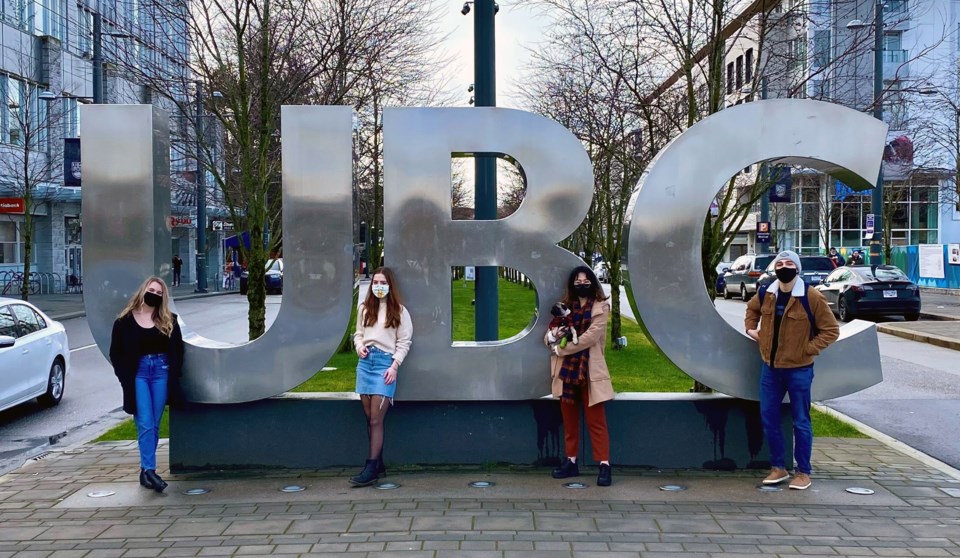They are paying to be in a premier learning environment while soaking up campus life. Instead most are locked in their bedrooms absorbing lectures on their laptops that potentially will shape the rest of their lives.
The COVID-19 pandemic has had a significant impact on post-secondary students. While public schools for students in kindergarten to Grade 12 re-opened in September, the risk has been considered too great for college and university campuses. There has been no in person learning since last March and it will certainly remain that way until at least next fall.
Some Delta university students recently reached out to the Optimist to share their experience and frustration as they attempt to work towards their degrees. Here’s what they had to say:
Rebecca Spencer/4th year political science student UBC
Spencer remembers her last day of classes at the Point Grey campus well. It happened to be Friday the 13th. Little did she know how foreshadowing it was. As a political science student who wants to be high school teacher, the Zoom platform is not delivering the same in person experience.
“With political science there are debates between classmates and discussions. Especially now as it’s a very interesting time in politics as obviously there is a lot happening. Zoom isn’t very conducive to that because you can’t really see your whole class at once or have the back and forth banter as much,” she explained.
“It’s the downfall of Zoom in university as it’s kind of made classes less engaging and diverse in discussion. I really feel sorry for the first year students who may not know anyone in their classes and it’s intimidated to speak up on video.”
To reduce online overload, Spencer is taking three courses per semester which will extend her time in school. It should at least mean graduating on campus.
“I find it harder to get motivated alone doing your work,” she added. “Before I did my work in a study group or at café with a friend. It just made the workload more doable as a shared experience.”
Arshia Shad/4th year Faculty of Science microbiology and immunology UBC
Through UBC’s Science Co-op program, Shad was about to step away from his studies for a position with the BC Cancer Research Institute when the pandemic struck.
“The position kept getting delayed over and over until end of July when I finally started working,” said Shad. “Our positions rely heavily on being in the lab itself and it’s all highly regulated. It’s definitely been a different work experience. I see very few of my co-workers outside of lab meetings.”
Shad says he is fortunate he will get full credits for his pandemic shortened Co-op experience that will conclude in April. It’s then back to courses in September and working towards his degrees.
“The big issue for me is everything being up in the air with lab classes next September. My fourth term is very lab intensive,” added Shad. “(Online) the quality of education definitely decreases but you’re still paying the same.”
Angela Vannatter/2020 Communication graduate Simon Fraser University
It was a good thing Vannatter had a few moments to step away from her new job or she would have missed her graduation ceremony.
“It was a virtual ceremony with no students where they just read the names and went through the whole class. I watched it while at work,” she said. “I feel like university institutions really tried to glamorize the graduation process to justify the money. No value was offered when that was taken away from us.”
When the pandemic closed SFU’s downtown campus in March, Vannatter decided to stick to her original plan which was continue online classes through the spring and summer and graduate in August. She was surprised she was still being charged for a U-Pass and student recreation fees when she was never returning to campus.
“I thought I could just opt out all the fees and the U-Pass. There was no justification of the value exchange. The prices stayed the same,” she said. “So many students organized virtually to protest all these things. Our voices were not being heard.”
Vannatter acknowledges why campuses need to be remain closed but says it’s a life experience that no virtual platform is ever going to replace.
“Our adult development is so dependent on socializing whether it’s personally, making friends or now, even in the work force, it’s who you know,” she added. “You can’t network with people and use resources from your university to go to events in person. You really are not left with many options.”
Maya Sato-Klemm/4th year UBC majoring in kinesiology and minor in biology
Sato-Klemm says her online learning experience has not only been a challenge but has resulted in extra work too.
“It’s just a bunch of little things as the professors are trying make up for not being in person,” she said. “You’re now having to do things little here in there to keep up with the classes all the time. Before you could focus on course and prioritize it. Now you have to be up-to-date on every class and personally for me I find it way more difficult.”
Learning from home has been no easy task either. Sato-Klemm is part of a large family and her dad also teaches drums at the Ladner home.
“I have younger siblings so our house is kind of a gong show,” she laughed. “Before the pandemic I didn’t even have a desk in my room. I studied in cafes almost exclusively. That environment was so nice and my house is so crazy.”
The pandemic has somewhat stalled Sato-Klemm’s career path that will eventually include med school. However, she feels fortunate she is not a first year university student going through this.
“All of my friends that are first year age I told them all to take a gap year,” she added. I can’t even imagine it. The first year was such a difficult jump to begin with.”



